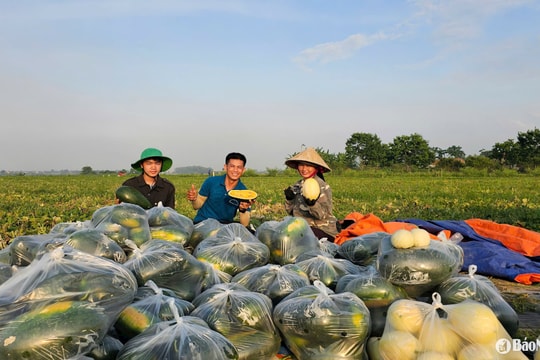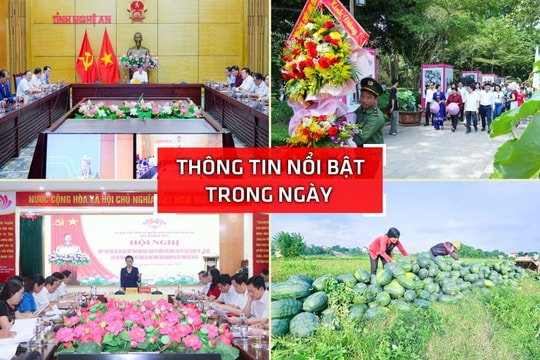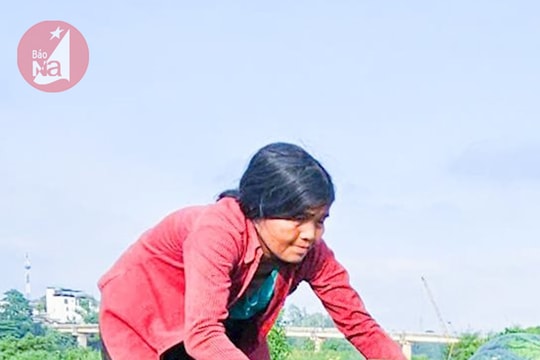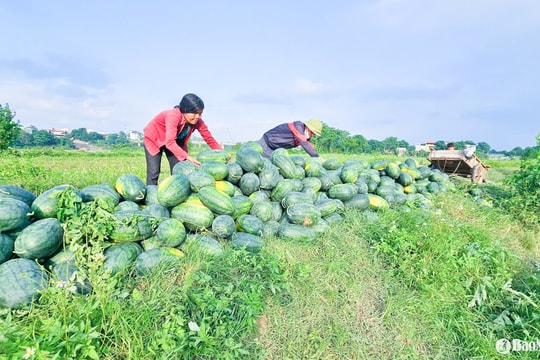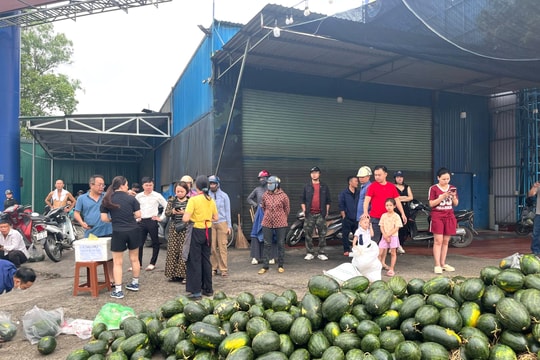The seasons of melons in foreign lands
(Baonghean.vn) - Watermelon, the fruit tree known as the "king of summer", often prefers strange lands, so when the homeland is "too familiar", farmers in Nghia Son commune (Nghia Dan district) are forced to wander everywhere to find land to rent to grow watermelons.
At first, it was the communes in the district, then they moved to the neighboring district of Tan Ky... and in recent years, they even moved to the Nhu Xuan area (Thanh Hoa) to rent land to grow melons. For three whole months, they built huts in the fields, living a nomadic life according to the melon seasons, happy and sad according to the gains and losses of melons...
Nomads and melons
Taking us to the Prison Camp area in Xuan Hoa commune (Nhu Xuan, Thanh Hoa) to witness the nomadic, exiled life of the melon farm owners, Mr. Tran Quoc Hong, Chairman of the Farmers' Association of Nghia Son commune, shared: "Around 2002 and 2003, watermelon plants began to take root in Nghia Son, bringing clear economic efficiency, 3-4 times higher than growing rice and other crops. But the difficulty of growing this type of melon is that it prefers strange fields, land that has been planted for 1-2 seasons, if planted for a third season, it will be very difficult to take care of, both in terms of yield and quality, cannot be sold at a good price, and income will decrease. Not willing to lose the economic benefits that watermelon plants bring, the people of Nghia Son actively thought of going to neighboring communes, districts in the province and even to other provinces to rent land to grow melons. At first, they also encountered difficulties and many obstacles. But with dynamism, perseverance, and hard work, they overcame obstacles, conquered foreign lands, and produced sweet melon seasons... The story of the melon growers in exile is very long, journalists should go there, contact them to understand and feel. Under the scorching sun of the first days of June, following the Ho Chi Minh trail, we made our way to the land of Nhu Xuan (Thanh Hoa) to meet the nomads, growing melons in a foreign land...
The first person we met was Mr. Le Van Hien (Son Dong hamlet, Nghia Son commune). He is one of the first households in Nghia Son to go to other districts to rent land to grow melons. This old farmer has 15 years of experience wandering around following the melon seasons. With his "dusty" and weathered appearance, he seems to be suited to a nomadic life. He waved his hand to the nearly 2-hectare melon hill in harvest season, his voice clear: "This variety likes strange things and is picky about soil. Luckily, this Xuan Hoa land is suitable for it. Melon plants on this land grow well, have few pests and diseases, large fruit, high sugar content and a distinctive aroma. It likes strange soil, so growers have to "here today, there tomorrow" according to the melon seasons. This year, we rent this hill, build a hut here, but next year we pack up and find new land. Each melon season is a different land. For the past 15 years, each year we live in a different place, building up to 15 huts." The first year, he rented land in Bai Tranh area, bordering Nghia Son (his hometown). They had rented all the outside areas, so he had to go to the deep area, where there was no electricity, no phone signal, and life was almost isolated from the outside. After setting up the shack, he carried up there tons of rice, dried food, and bought necessary items such as oil lamps, flashlights, and generators. The generators used oil, so they only prioritized pumping water from streams and streams to water the melons. As for the men, they had to endure the heat, eating dinner under dim flashlights or flickering oil lamps. Men, who were used to their wives taking care of their meals and laundry, had to do everything themselves when they came here. Life with “rice in a pot, water in a jar” in a foreign land was difficult and miserable in every way. Rice cooked on a firewood stove was sometimes burnt, sometimes not; dried fish was fried salty and vegetables were boiled, “both quick and convenient”. However, food was not a concern, what was more worrying was personal safety. “At first, I was a bit nervous. Being alone in a foreign land, my possessions were not worth much, but if I met a bad person who was trying to harass me, who could I call? But luckily, the people here were kind, and I gradually got used to it. The melon farmers in the expatriate area were all from Nghia Son, so we were very united. If anything happened, we would call each other. Now, it is more convenient to have mobile phones, so we can contact each other immediately if anything happens...” In the following seasons, he often hired a few local young men, paying 4.5 to 5 million VND per month to work and watch over the melon field. Only during important periods such as pollination, fruit setting and harvesting would he move into the shack.
As for Mr. Nguyen Van Cong, the three uncles and nephews have jointly rented land to grow melons for ten years. "Buy with friends, sell with partners", the uncles and nephews invited each other to come here to rent land to do business, having relatives helps them worry less about this and that. When we first came here, we were new to the land and the land, so we invited the locals to grow together, one took care of the land fund, the other took care of the capital, and the profits were divided by percentage. But after the first few seasons, they withdrew because they saw that we were "risky", pouring money into the land without knowing what we would gain or lose. In the end, the three uncles and nephews stayed. Each season, they rented a piece of land, set up a tent to plant seeds, grow melons and grow melons. During those three months, they took turns taking care of the melons. They got up at 2am to water the melons. After watering 3 hectares of melons, it was already past noon, and then they had to worry about cooking. There were still small children at home, so the wife had to stay in the countryside to take care of them. I am the only one staying here.” The hut of Cong’s nephew seems more solid than the other huts around. It has walls and a thatched roof, and there is electricity, a fan, and even a television. In addition, he also raises dogs and chickens “for fun and to make use of leftover food.” Their calendar is not based on days and months but on the growth cycle of the melon plants, from planting to harvesting. Their joy is also wrapped up in the gains and losses of the melon seasons.
Sweet-bitterthe seasonsmelon
After 15 years of nomadic life, wandering around to make a living, living temporarily in a tent, but in return, thanks to growing melons, Mr. Hien was able to buy land to plant forests, open a restaurant and send his son to work abroad. He shared: "Thanks to melons. The abundant life today is thanks to the melon seasons. It's hard work and hardship, but in return, he has a business. Now I'm used to growing melons, I'm used to living nomadically, living in an unfamiliar place, my hands and feet are very bored." So, he handed over the restaurant to his wife to manage. He still wandered around following the melon seasons. During those 15 melon seasons, there were seasons when he made a big profit. That was in 2008, 2 hectares of melons brought him 760 million VND in profit, he invested nearly 400 million VND to buy land to plant forests. But there were also many bitter melon seasons. “There are many losses. There were years when we rented bad land, planted seeds, the plants grew well, no pests or diseases, but when it came time to flower and bear fruit, they didn’t work. Hundreds of millions of dong spent on land rent, plowing, seeds, fertilizers, hiring workers, and three months of living in tents and camps were all wasted. Total loss! It was bitter, but what could we do? Growing watermelons was like “gambling with the sky”, if the weather was favorable, the soil was fertile, and water was available, it was considered “winning it all”, but if the weather was bad, it was a loss. Doing business, we have to accept it.”
This year, Thuy Sy's family (Son Dong hamlet, Nghia Son commune) rented 3 hectares of land in Bai Tranh to grow melons. When the melon plants were ready to bear fruit, they suddenly dried up and withered for no apparent reason. They were left empty-handed! There were also seasons when the melons had a good harvest, but due to falling prices and pressure from traders, they could not sell them, and melon growers had to accept the loss.
The old farmer couple Tai Hoa (Son Lien hamlet, Nghia Son) has been renting land to grow melons for 7-8 years now. He and his wife are considered to have a "lucky hand" because they have never had a loss. This year, his family rented 1.2 hectares of land to grow melons. After 3 months, they harvested 35 tons of grade 1 melons. With the early season price of 6,000 VND/kg, his family earned 220 million VND, minus expenses, net profit of 150 million VND. Mr. Tai shared: “The melon growing business is very unstable. When the harvest is good, the price is low, when the price is good, the harvest is bad. Spending 70-80 million on the land, after 3 months, when the melons are transferred to the truck for traders, holding the money in hand, you will know the profit or loss. The main thing is to master the science and technology, choose the right good varieties, and take care of the melons according to the right process so that the melons grow well, are free of pests and diseases, and produce large, high-quality fruit. Secondly, when “opening the farm” (harvesting melons), it must be at the right time: when other fruits are not in season, on weekdays (full moon, first day of the month), the melons are more expensive and easier to sell. Thanks to that, the income is higher.”
So we know, the story of people who spend all year round wandering to make a living with the melon seasons is not always favorable, nor do they get to enjoy the sweet fruit seasons. Living a nomadic life, taking care of things, investing capital but there are melon seasons with bitter fruit, crying because the melons do not achieve productivity, sometimes the productivity is achieved but the price drops miserably...


